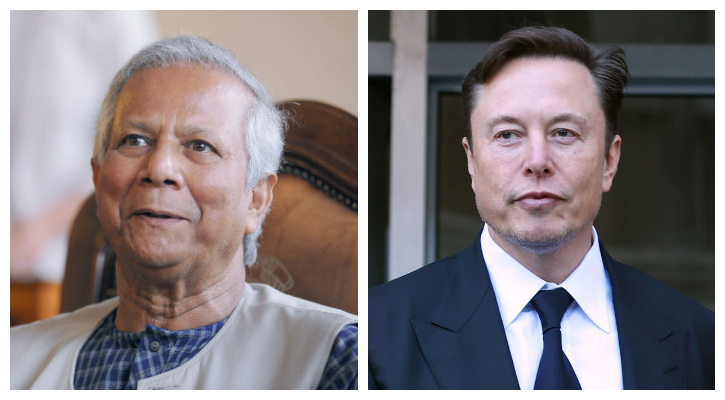Elon Musk, one of the wealthiest individuals in the world and the most trusted confidant of U.S. President Donald Trump, is now the U.S. Secretary of Skills Development.
He is one of the most influential people globally. World leaders strive to get a chance to speak with him, and meeting him is considered a great privilege. Yet, it was Elon Musk who called Bangladesh’s Chief Advisor, Dr. Muhammad Yunus. Their conversation took place in a cordial atmosphere, and Dr. Yunus warmly invited Elon Musk to visit Bangladesh. This small example illustrates the transformation of Bangladesh’s diplomacy and its changing global narrative.
In less than seven months since taking office, Nobel Peace Prize laureate Dr. Muhammad Yunus has not only revitalized Bangladesh but has also elevated the country to a new position of global prestige. There was a time when Bangladeshi government officials and heads of state had to lobby for invitations to international events. Even when they attended, they were often overlooked or given little importance. Diplomats struggled to arrange bilateral meetings, often settling for a chance encounter or a photo opportunity at a casual gathering. Such encounters were then used for political gain.
However, in just six months, Dr. Yunus has transformed this scenario. His personal stature, global influence, and reputation have made him the center of attraction among world leaders. As a result, Bangladesh is now held in higher regard on the international stage. Today, Bangladeshi diplomats no longer have to seek out meetings with foreign leaders; instead, countries are requesting meetings with Dr. Yunus. Bangladesh’s voice is being heard worldwide, and the country has become a focal point of global interest.
For instance, consider Dr. Yunus’s recent participation in the World Government Summit in Dubai. During his brief two-day visit, he met with several prominent figures, thereby enhancing Bangladesh’s global standing. He also delivered a speech at a plenary session, a prestigious opportunity in itself. Notably, the session was moderated by Becky Anderson, a renowned CNN journalist. In the past, it was unimaginable for a Bangladeshi leader to be part of such a session, but Dr. Yunus’s international reputation has made it a norm.
Since taking office, he has participated in numerous high-profile global conferences, leaving a lasting impact. In September last year, he attended the 79th session of the United Nations General Assembly, marking his first international trip as Chief Advisor. Unlike previous leaders who traveled with large entourages, wasting taxpayers’ money, Dr. Yunus led a small, efficient team. Instead of waiting for his turn to deliver a speech, he actively engaged with world leaders, including U.S. President Joe Biden, and sought international cooperation for rebuilding Bangladesh.
In November, he attended the UN Climate Change Conference, where his “Three Zero” theory—zero poverty, zero unemployment, and zero net carbon emissions—garnered significant attention. Unlike past Bangladeshi leaders who simply sought aid at such events, Dr. Yunus positioned Bangladesh as a thought leader in climate change solutions.
In December, he attended the D-8 Summit in Egypt, where he was a central figure. During his visit, he delivered an inspiring speech at Al-Aqsa University, which greatly motivated young people. His presence at such events continues to elevate Bangladesh’s status.
At the beginning of this year, Dr. Yunus attended the World Economic Forum in Davos, Switzerland, where he called for international partnerships to rebuild Bangladesh. His presence and contributions at the forum further enhanced Bangladesh’s global image.
Unlike previous leaders who sought personal recognition and foreign support to retain power, Dr. Yunus’s diplomacy is centered on elevating Bangladesh’s status. His leadership has led to unprecedented diplomatic achievements. For instance, he invited mission heads from 26 European Union countries—who previously managed Bangladesh affairs from Delhi—to visit Dhaka for direct discussions. Such diplomatic success was unheard of in Bangladesh’s history.
Dr. Yunus has also engaged in direct conversations with world leaders and invited ambassadors to his office for discussions on Bangladesh’s future.
Furthermore, his role was crucial in the recent UN Human Rights Commission report on human rights violations in Bangladesh. The report provided international recognition of the violent suppression of student protests in July-August last year, officially acknowledging the July Massacre. Previously, such incidents were dismissed as political disputes, but Dr. Yunus’s influence helped establish them as undeniable global truths.
Since the people’s uprising on August 5, Bangladesh has been moving forward under a new governance framework. International support and sympathy are critical at this time, as the country faces economic challenges and needs foreign assistance. Dr. Yunus’s diplomatic approach has redefined Bangladesh’s global identity—not as a nation seeking aid, but as one commanding respect and collaboration. In just six months, he has transformed Bangladesh’s foreign policy into one of dignity and partnership, illuminating the country’s presence on the world map like never before.

